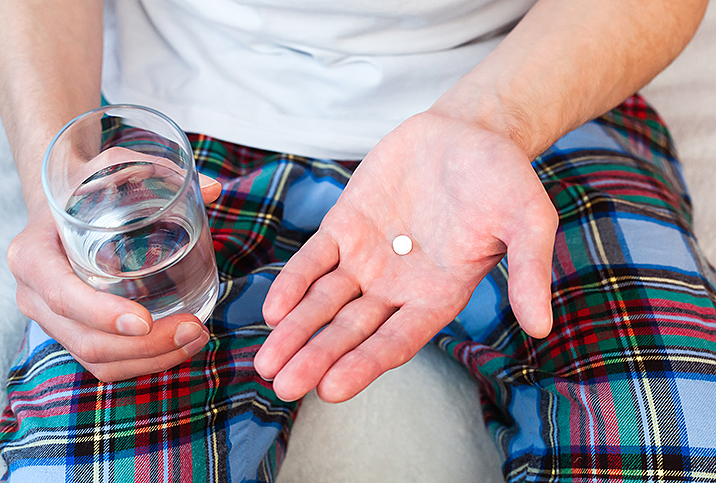Antidepressants Can Lift Your Mood but Suppress Erections

We all know 2020 was a rough year, to say the absolute least. From January to September 2020, nearly 535,000 people took an online screening for depression—a 62 percent increase over the total number for all of 2019, according to Mental Health America.
Still, while many people are seeking help, men typically speak about their mental health less often than women. This is especially troubling when you consider the suicide rate is almost four times higher for men than it is for women, and men are also nearly twice as likely as women to binge drink.
It makes sense, though. Men are taught to be tough, and while the stigma around mental health is fading, it is still an uphill battle for many men to speak openly about their problems. However, men who speak up might find their depression is more manageable than they thought—and they have several options for treatment, such as therapy and medication. When properly prescribed and used, antidepressants can significantly ease the symptoms of depression.
But men might be concerned about the side effects of taking antidepressants, namely, one that all men would like to avoid: erectile dysfunction (ED).
Why antidepressants cause erectile dysfunction
Many popular and common antidepressants are classified as SSRIs—selective serotonin reuptake inhibitors—which work by controlling the flow of serotonin to the central nervous system.
The increase in serotonin usually alleviates symptoms of depression. Still, studies have shown that an increase in serotonin can also affect other neurotransmitters in the body, such as dopamine and testosterone. The sexual side effects from SSRIs likely develop here because testosterone impacts sexual arousal, and dopamine is a significant component in achieving orgasm.
Erectile dysfunction isn't the only side effect that SSRIs can have on sexual performance. In many cases, the effect is delayed ejaculation or a change in sexual desire, arousal, comfort and satisfaction. But most men feel embarrassed to talk about ED.
How to deal with ED caused by antidepressants
First and foremost, remember that there's no reason to be ashamed if a mental health medication is causing issues for you sexually. Societal expectations for men put a lot of focus and pressure on sexual performance, but that's not all that makes a man—your partner can count your attributes.
Still, nobody wants to experience problems in the bedroom, and as a result, many men stop taking their antidepressants to combat the issue. Of course, this only causes other problems in the long term, and depression left untreated can make life exceedingly more difficult. You should never stop taking your antidepressants without speaking to your doctor first because you could experience a significant worsening in your symptoms as part of a withdrawal-like process.
What are your options?
The first step in any medical situation is to consult your doctor or healthcare professional. It's an awkward, uncomfortable situation to talk about ED, but keep in mind that your doctor is both accustomed to hearing about the problem and trained to handle it. Here are some of the most common suggestions for dealing with ED caused by antidepressants:
- Wait it out. If you're just starting on medication, your body needs time to adjust. After a while, the issue might resolve on its own.
- Lower your dosage. In many cases, the dosage of your medication might simply be too high. If your medication can alleviate depression symptoms at a lower dosage, reducing your intake might solve your erectile problems, too.
- Switch medications. SSRIs aren't the only form of antidepressant. While they do share common side effects, a serotonin and norepinephrine reuptake inhibitor (SNRI) or another form of drug might make a difference in how your body reacts.
- Take additional medication to assist with the sexual effects. Other medications such as Viagra or Cialis can make up for lost libido and erectile functionality. Again, consult your doctor before taking any of these medications.
Conclusions
The process of finding the proper mental health medication can sometimes be long and arduous, with a lot of trial and error. The only way to ensure you're getting the appropriate treatment is to be honest with your doctor and keep in mind that the side effects of your medication aren't a reflection of who you are.


















